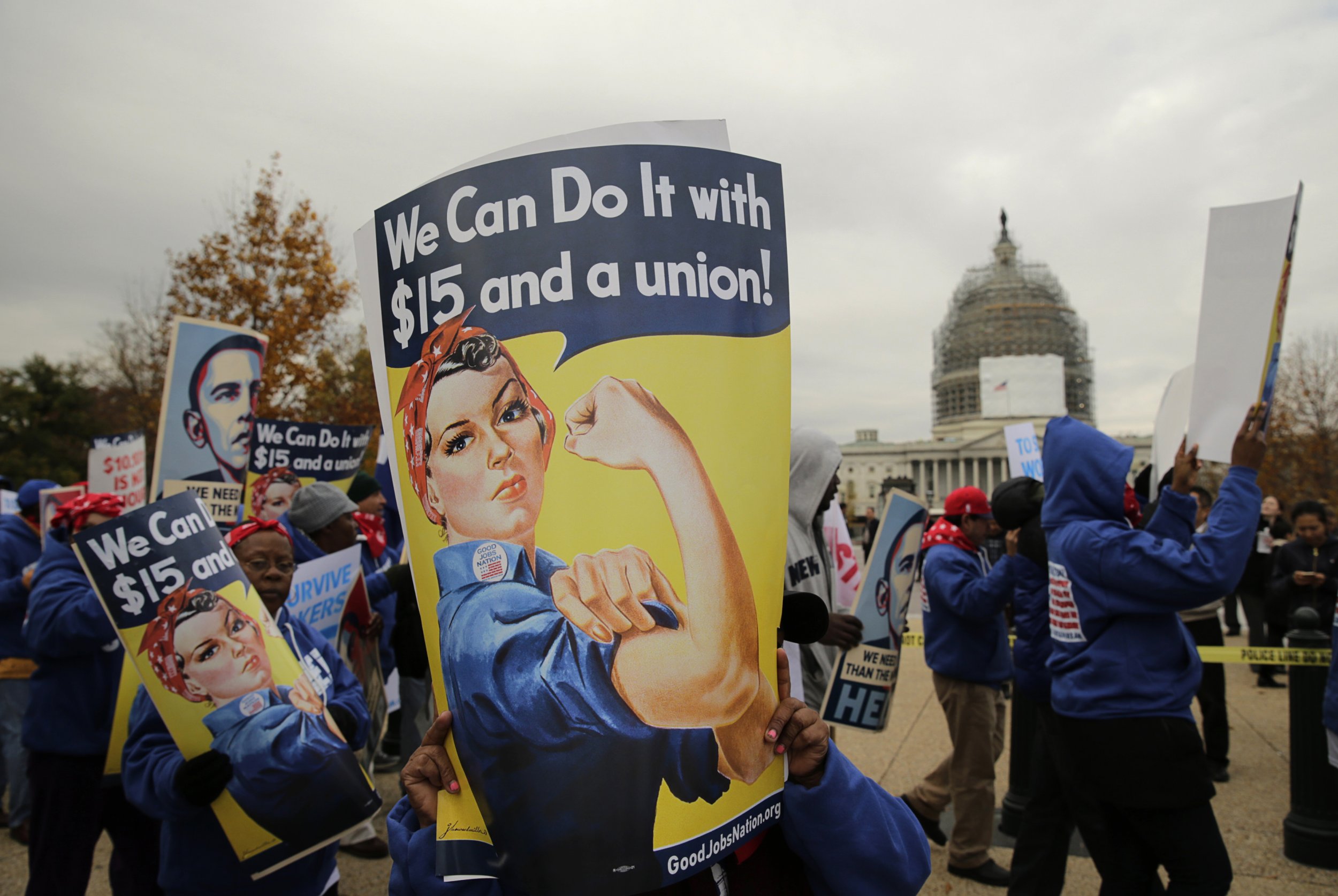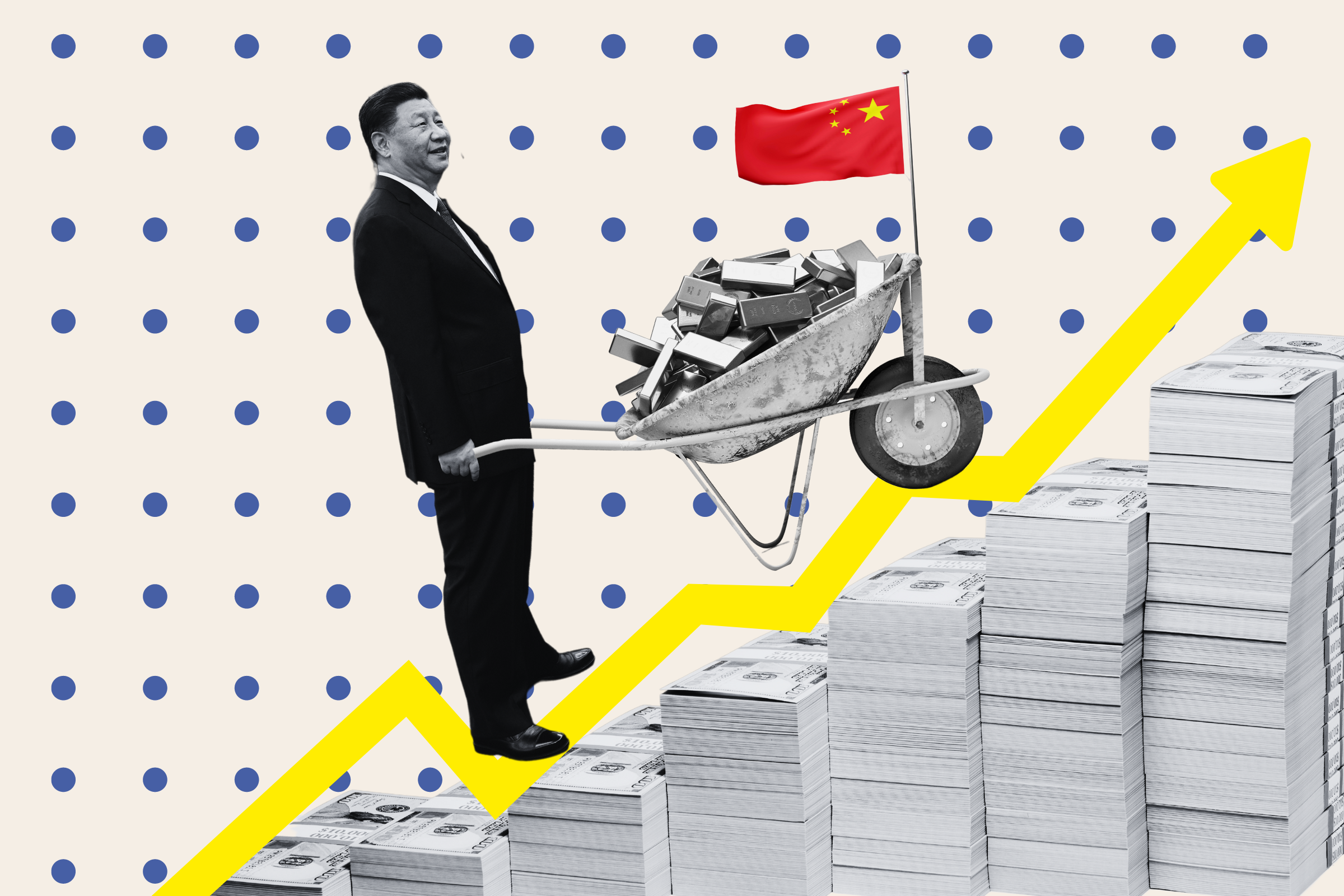
Thousands of Americans who work in fast-food restaurants walked off their jobs for a day again earlier this month, once more disrupting breakfast, lunch, and dinner hours in neighborhoods around the country.
Their strikes have provoked a broad debate over minimum wage levels at local and national levels, which is long overdue.
But that's just part of what this movement is about. From the beginning, the fast-food cashiers and cooks who launched the "Fight for $15" declared that they have a vision for how they can turn their jobs into work that sustains their families and frees them from depending on public assistance: a union.
They are not alone in uniting behind this vision. In an era of increasingly precarious careers and deepening economic insecurity, wide-ranging groups of working people—from adjunct professors to child care workers to digital media journalists to auto parts workers—are joining together to start new unions so they can speak with a more powerful voice about their future.
In a larger sense, all of these people who are working together to restart the union movement are pointing out something that should be obvious by now: that a grand economic experiment that America's wealthy corporate elites launched a generation ago has been a destructive failure for wage-earning Americans.
About 40 years ago, corporations decided to break apart unions in the United States, focusing first on the unions organized by people working in private sector jobs.
The implicit promise about this experiment that was made to the rest of us was that by crushing unions, corporations would be free to be more efficient, more flexible and more profitable. This was supposed to generate more growth and make life better for all of us.
Of course, that's not what happened. In reality, suppressing unions made it much easier for corporations to push the economy way of out balance. With nobody sitting across from them at a bargaining table, it became all too easy for CEOs to simply take more and leave the rest of us with less.
The result has been that working Americans' share of our country's overall economic output—what the Federal Reserve calls the "Nonfarm Business Sector Labor Share"—has collapsed. For decades, wages for most people have stayed flat or fallen. For an ordinary American, the real purchasing power of the average wage is not any higher now than it was in 1973.
At the same time, real incomes for the CEO class have soared to the point that it sometimes seems that they have flown off in their Gulfstream jets to live on a different, better planet.
Economists and historians looking for reasons for why incomes in the United States have become more and more unequal now point towards the dismantling of unions as a key factor.
We need stronger unions again to raise wages and strengthen the purchasing power of typical families, because that consumer spending is what will sustain and fortify our recovery from the 2008 financial crisis and into the future.
We need stronger unions again because everyday American families need institutions that can at least partially offset the astonishing power that the wealthiest Americans have over our government and our elections.
Minimum wage increases are great, but they are not enough. Workers shouldn't have to rely on sporadic and incremental raises dependent on the goodwill of politicians. They need an ongoing vehicle for making sure their wages rise with profitability, productivity, and economic growth.
Nobody thinks that restoring a broad-based, powerful union movement is going to be easy. Corporations have been both relentless and successful in their effort to cripple unions.
More than 90 percent of Americans who are employed by a private company do not belong to a union. In some states, public employees have succeeded in preserving their organizations, but a network of billionaires are funding a pending Supreme Court case that will likely soon make it more difficult for teachers, firefighters and other public employees to maintain strong unions.
Still, there are important reasons to be optimistic when it comes to creating a new kind of movement of working Americans.
There are signs that growing numbers of Americans simply want stronger unions again. The most recent Gallup poll of the overall public found that support for unions spiked up to 58 percent this year, a jump of five percentage points over just one year.
And a closer look at polling trends shows even stronger support for unions among the workforce of the future. A Pew survey released earlier this year found that Americans between the ages of 18 and 29 view unions favorably at a significantly higher level than older workers.
For people who are paid less that $15 per hour, that support is even more intense. A National Employment Law Project survey released last month found that 72 percent of people who are paid at that level support unions. Among 18-29 year olds paid less than $15, support rises to 82 percent.
That shifting sentiment in favor of rebuilding a strong union movement will eventually shift our politics.
For now, nearly all elected Republicans are implacably opposed to any attempt to give Americans more freedom to form unions. But Democratic voters and elected officials are growing more willing to back 21 st century unions as an important method to restore wage growth and create more inclusive prosperity.
Larry Summers and Robert Rubin—both seen as business-oriented "centrists" within the Democratic Party—have recently spoken out boldly about the need to rebuild unions.
Right now, it's too difficult for working people to organize unions, so a shift in politics would certainly make it easier for people to start new unions on a large scale. The 1935 Wagner Act—the law that created a federal right to join a union — was severely weakened by conservative attacks in 1947 and 1959. Progressives in Congress attempted to bolster workers' freedom to form unions in 1977 and 2009, but they failed.
It's time to think about what the law should look like in the 21st century in a service-based, part-time economy.
The conventional wisdom today is that there is little hope for changing the rules for how people form unions because of polarization and gridlock. Many people assume it will stay this way and that it will take decades for a breakthrough to come.
But not long ago, most of us assumed it would take at least a generation for gay Americans to win the right to get married. Change can seem to take forever until it suddenly happens quickly.
It's also important to remember that working Americans succeeded in building unions well before the Wagner Act existed. Even in a fiercely hostile legal and political climate, men who operated locomotives, men who mined coal, women who sewed clothing and many other kinds of working people used tenacious, creative tactics to build unions and persuade corporations to sit down with them, even when they had no real legal right to do so.
Corporations don't have to wait for Congress and the President to let them change how they deal with their employees. A company like McDonald's—which today is struggling with a rapidly declining public reputation at least partly because it pays its employees so little—could decide tomorrow to reboot how consumers think about it by creating a new relationship with the people who serve its food. The company could find a way to support the creation of a McDonald's employee organization and include its cooks and cashiers in the process of making the McDonald's a leading edge business again.
This new kind of organization likely won't look like our grandfathers' unions. Today's economy calls for something different.
But we do need to figure out the organization that allows the more than 60 million people that make less than $15 an hour to be engaged in their economic and political lives. They need an organization that isn't just about raising the minimum wage—one that they can join if they want, that negotiates for wages and health insurance and sick days today and over the long run.
Right now, you've got millions living on the fringes, barely figuring out how to make it. We are supposed to live in a country where our kids do better. That's not the case. The fast-food strikes are just one sign that working Americans have been pushed to the limit and are eager to stick together to fight for economic stability.
For sustained prosperity and a more democratic way of life, there is no substitute for making sure that working Americans have the freedom to build their own strong organizations to join together for jobs that make thriving communities possible.
Dorian T. Warren is a fellow at the Roosevelt Institute and Chair of the Board at the Center for Community Change.
Uncommon Knowledge
Newsweek is committed to challenging conventional wisdom and finding connections in the search for common ground.
Newsweek is committed to challenging conventional wisdom and finding connections in the search for common ground.
About the writer
To read how Newsweek uses AI as a newsroom tool, Click here.








